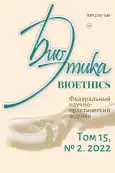Modified pre-abortion counseling section
- Authors: Tkachenko L.V.1, Gritsenko I.A.1, Tikhaeva K.Y.1, Gavrilova I.S.1, Dolgova V.A.2
-
Affiliations:
- Volgograd State Medical University
- Волгоградский государственный медицинский университет
- Issue: Vol 15, No 2 (2022)
- Pages: 59-65
- Section: Applied Bioethics
- URL: https://journal-vniispk.ru/2070-1586/article/view/114780
- DOI: https://doi.org/10.19163/2070-1586-2022-15-2-59-65
- ID: 114780
Cite item
Full Text
Abstract
The problem of pregnancy termination is multifaceted. According to the current legislation, women who come to a healthcare facility for an induced termination of pregnancy undergo pre-abortion counseling. During the consultation, the specialist has several tasks: to compare the arguments for pregnancy termination or preservation; to help competently assess the current life situation; to consider ways to solve problems; to provide information about federal and regional support measures for pregnant women and families with children; to inform about possible negative consequences of an artificial termination of pregnancy. The authors believe that in addition to psychological assistance to women in the situation of choice, it is of great importance to provide detailed information about the negative reproductive consequences of abortion, including the problem of premature ovarian insufficiency. Due to the high prevalence of premature ovarian insufficiency among female population, it seems necessary to supplement the existing pre-abortion counseling procedure with a section devoted to the problem of physiological and pathological loss of ovarian reserve and the impact of pregnancy termination on this process. To inform a woman about her risk of premature ovarian insufficiency and about her presence of this condition in general would allow a woman to consciously avoid additional negative influences (smoking, alcohol, stress), make an informed decision about her reproductive plans and their timing, and possibly resort to oocyte cryopreservation methods in cases where the risks of premature ovarian insufficiency are extremely high. When premature ovarian insufficiency is already diagnosed, the only way to have a baby is to use assisted reproductive technology, but with the use of donor eggs.
Full Text
##article.viewOnOriginalSite##About the authors
Liudmila V. Tkachenko
Volgograd State Medical University
Email: biosoc@yandex.ru
ORCID iD: 0000-0002-1935-4277
MD, Dr Sci Med, Professor, Head of the Department of Obstetrics and Gynecology; Research Group «Reproductive Medicine and Reproductive Genetics»
Russian Federation, VolgogradIrina A. Gritsenko
Volgograd State Medical University
Author for correspondence.
Email: irina-gritsenko@yandex.ru
ORCID iD: 0000-0001-6761-2990
MD, PhD, Associate Professor, Department of Obstetrics and Gynecology; Research Group «Reproductive Medicine and Reproductive Genetics»
Russian Federation, VolgogradKsenia Yu. Tikhaeva
Volgograd State Medical University
Email: tikhaeva34@gmail.com
ORCID iD: 0000-0002-1956-6448
MD, PhD, Associate Professor, Department of Pathophysiology, Clinical Pathophysiology; Research Group «Reproductive Medicine and Reproductive Genetics»
Russian Federation, VolgogradIrina S. Gavrilova
Volgograd State Medical University
Email: biosoc@yandex.ru
ORCID iD: 0000-0002-4175-5499
PhD (Philosophy), Associate Professor, Department of Medical and Social Technologies with the Course in Pedagogy and Educational Technologies of Additional Professional Education; Research Group «Reproductive Medicine and Reproductive Genetics»
Russian Federation, VolgogradValeriia A. Dolgova
Волгоградский государственный медицинский университет
Email: biosoc@yandex.ru
ORCID iD: 0000-0003-0260-1670
4th year Student, Faculty of General Medicine; Research Group «Reproductive Medicine and Reproductive Genetics»
Russian Federation, ВолгоградReferences
- Ratmanov M. A. et al. The problem of reproductive choice: strategic directions in a demographic situation and a systematic approach to the prevention of medical abortion. Voprosy ginekologii, akusherstva i perinatologii = Issues of gynecology, obstetrics and perinatology. 2020;19(3):124–132. (in Rus.).
- Balina T. N. Reproductive attitudes of women in the context of the legislative right to abortion. Filosofiya prava = Philosophy of Law. 2018;1(84). (in Rus.).
- Puchkova Yu. M. Study of the factors that determine the reproductive choice of women. Sotsialnaya dinamika naseleniya i ustoichivoe razvitie = Social dynamics of the population and sustainable development. 2019:102–105. (in Rus.).
- Ivanova A. D., Suldin A. M. Social portrait of a woman who came for an abortion. Effectiveness of pre-abortion counseling. Aktualnye problemy teoreticheskoi, eksperimentalnoi, klinicheskoi meditsiny i farmatsii = Actual problems of theoretical, experimental, clinical medicine and pharmacy. 2018:262–262. (in Rus.).
- Information and methodological letter of the Ministry of Health of the Russian Federation dated July 17, 2017 No. 15-4/10/2-4792 "Psychological counseling for women planning artificial termination of pregnancy". (in Rus.).
- Sheimukhova L.V., Kartlamayeva E.V. Psychological counseling in a situation of reproductive choice ("pre-abortion counseling"). Work experience of the psychological department of the City Clinical Hospital No. 1 (Perinatal Center). Natsionalnye proekty – prioritet razvitiya zdravookhraneniya regionov = National projects – a priority for the development of health care in the regions. 2019;257–259. (in Rus.).
- Cordts E.B., Christofolini D.M., Dos Santos A.A. et al. Genetic aspects of premature ovarian failure: a literature review. Arch Gynecol Obstet. 2011;283(3):635–643. https://doi.org/10.1007/s00404-010-1815-4.
- Panay N., Anderson R.A., Nappi R.E. et al. Premature ovarian insufficiency: an International Menopause Society White Paper. Climacteric. 2020;23(5):426–446. https://doi.org/10.1080/ 13697137.2020.1804547.
- Webber L., Davies M., Anderson R. et al. European Society for Human Reproduction and Embryology (ESHRE) Guideline Group on POI. ESHRE Guideline: management of women with premature ovarian insufficiency. Hum Reprod. 2016;5(31):926–937. https://doi.org/10.1093/humrep/dew027
- Chae-Kim J.J., Gavrilova-Jordan L. Premature ovarian insufficiency: procreative management and preventive strategies. Biomedicines. 2019;7(1);2. https://doi.org/10.3390/ biomedicines7010002.
- Hoekman E. J. et al. Ovarian tissue cryopreservation: Low usage rates and high live‐birth rate after transplantation. Acta obstetricia et gynecologica Scandinavica. 2020;99(2):213–221. https://doi.org/10.1111/aogs.13735.
- Leonel E.C.R., Lucci C.M., Amorim C.A. Cryopreservation of human ovarian tissue: a review. Transfusion Medicine and Hemotherapy. 2019;46(3):173–181. https://doi.org/10.1159/ 000499054.
- Nguyen H.H., Milat F., Vincent A. Premature ovarian insufficiency in general practice: meeting the needs of women. Aust Fam Physician. 2017;46(6):360–366.
- Golezar S., Ramezani T.F., Khazaei S. et al. The global prevalence of primary ovarian insufficiency and early menopause: a meta-analysis. Climacteric. 2019;22(4):403–411. https://doi.org/10.1080/13697137.2019.1574738.
Supplementary files










